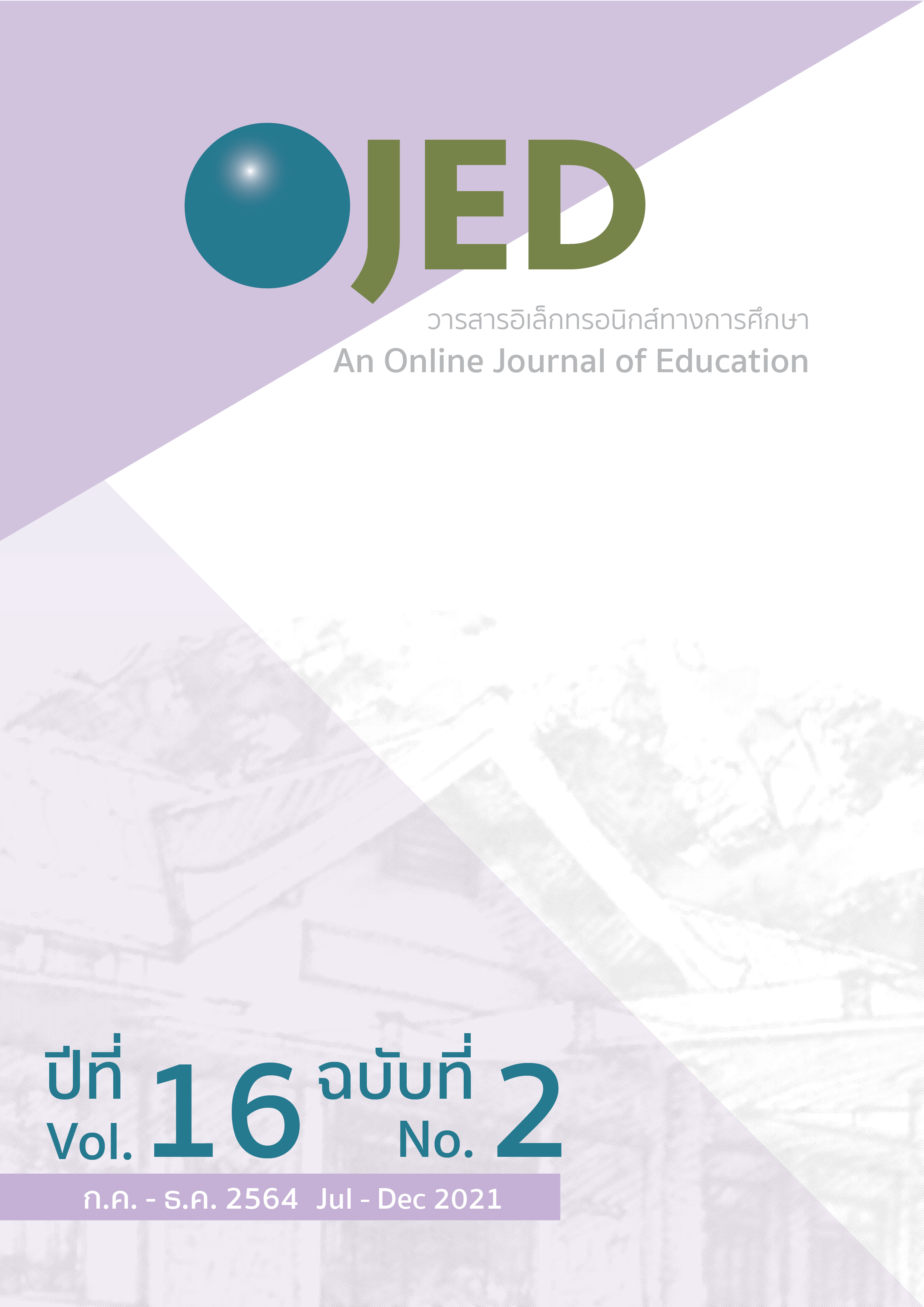Teachers’ Beliefs and Practices Towards Teaching English Pronunciation Among English as a Foreign Language Senior High School Teachers in Yunnan Province, China
DOI:
https://doi.org/10.14456/ojed.2021.17Keywords:
EFL teachers’ beliefs, practices, English pronunciationAbstract
The objectives of this study were 1) to examine the EFL senior high school teachers’ beliefs towards teaching English pronunciation and 2) to investigate the English pronunciation practices of EFL senior high school teachers use in Yunnan province. The participants were 59 EFL senior high school teachers in Yunnan province who were purposively sampled. There were 3 research instruments which were 1) online questionnaire; 2) semi-structured interview and 3) classroom observation. Quantitative data were analyzed by the descriptive statistics, included the means and standard deviation and qualitative data were analyzed by content analysis. The findings revealed that 1) Yunnan EFL teachers’ beliefs towards pronunciation teaching was highly positive and most of them believed that it was really necessary to teach English pronunciation. The pronunciation teaching goals were mixed between native-like fluency and intelligibility. 2) Yunnan EFL teachers spent some but not much time on teaching segmental features and supra-segmental features. Because of the examination-oriented system, time limitation and lacking of pronunciation teaching training, Yunnan EFL teachers used traditional teaching methods and controlled practices to teach pronunciation. Thus, English pronunciation teaching should be given an attention among EFL teachers and they should apply different teaching methods.
References
Alsofyani, M., & Algethami, G. (2017). Exploring EFL teachers’ beliefs and practices regarding pronunciation teaching in a Saudi setting. Arab World English Journal, 8(4), 384-400. https://doi.org/10.24093/awej/vol8no4.26
Atli, I., & Bergil, A. S. (2012). The effect of pronunciation instruction on students’ overall speaking skills. Procedia-Social and Behavioral Sciences, 46, 3665 – 3671. https://doi.org/10.1016/j.sbspro.2012.06.124
Breitkreutz, J., Derwing, T. M., & Rossiter, M. J. (2001). Pronunciation teaching practices in Canada. TESL Canada Journal, 19(1), 51-61. https://doi.org/10.18806/tesl.v19i1.919
Buss, L. (2016). Beliefs and practices of Brazilian EFL teachers regarding pronunciation. Language Teaching Research, 20(5), 619-637. https://doi.org/10.1177/1362168815574145
Fernandez, D. M., & Hughes, S. (2010). Student teacher perceptions of pronunciation tasks in Andalusia. The Buckingham Journal of Language and Linguistics, 2, 107-125. https://doi.org/10.5750/bjll.v2i0.12
Foote, J. A., Holtby, A. K., & Derwing, T. M. (2011). Survey of the teaching of pronunciation in adult ESL programs in Canada, 2010. TESL Canada Journal, 29(1), 1-22. https://doi.org/10.18806/tesl.v29i1.1086
Gilakjani, A. P. (2012). A study of factors affecting EFL learners' English pronunciation learning and the strategies for instruction. International Journal of Humanities and Social Science, 2(3), 119-128. http://ijhssnet.com/journals/Vol_2_No_3_February_2012/17.pdf
Li, W. (2017). “Yi dai yi lu”chang y ixia Yunnan sheng gao zhi shang wu ying yu zhuan ye de jiao xue gai ge tan xi [Analysis on the teaching reform of business English majors in higher vocational colleges in Yunnan Province under the "One Belt One Road" initiative]. English Teacher, 17(16), 143-145. https://rb.gy/abxfrr
Ma, L. Y. (2013). Fan si gao zhong sheng ying yu yu yin jiao xue de wen ti ji ce lue. [Rethinking the problems and strategies of English pronunciation teaching for senior high school students]. English Square, 3(11), 150-151.
https://doi.org/10.16723/j.cnki.yygc.2013.11.086
Ministry of Education of the People's Republic of China (2017). Pu tong gao zhong ying yu xin ke cheng biao zhun (2017 ban) [The National English Curriculum Standards for general High School issued by 2017]. People’s Education Press.
Yagiz, O. (2018). EFL language teachers' cognitions and observed classroom practices about L2 pronunciation: The context of Turkey. Novitas-ROYAL (Research on Youth and Language), 12(2), 187-204. https://eric.ed.gov/?id=EJ1195280
Yan, N. (2008). Xi nan shao shu min zu di qu ying yu yu yin jiao xue xian zhuang ji zhan wang: Yi Yunnan wei li [The current situation and prospects of English pronunciation teaching in southwestern minority areas: Taking Yunnan province as an example]. Journal of Research on Education for Ethnic Minorities, 35(5), 55-58. https://doi.org/10.15946/j.cnki.1001-7178.2008.05.003
Yang, Z. X. (2015).Gao zhong ying yu yu yin jiao xue de shi jian he si kao [Practice and thinking of English pronunciation teaching in senior high school]. Journal of Dehong Teachers College, 24(1), 89-95. https://www.docin.com/p-1245950514.html
Yunnan Statistics Bureau of Education Development (2020, April 19). Yunnan sheng 2019-2020 xue nian chu quan sheng jiao yu shi ye fa zhan tong ji gong bao. https://www.027art.com/yunnanedu/HTML/4622765.html
Zhang, B. (2018). English language teachers' required knowledge and self-efficacy beliefs about pronunciation instruction. Electronic Thesis and Dissertation Repository. https://ir.lib.uwo.ca/etd/5290
Zhao Q. J. (2017). Yunnan yu zhou bian guo jia gao xiao xue sheng ying yu xue qing dui bi yan jiu: Yi xin jia po, tai guo, lao wo wei li [A study on comparative college students' English learning between Yunnan and neighboring countries: Taking Singapore, Thailand, and Laos as examples]. Comparative Study of Cultural Innovation, 1(21), 64-67. https://rb.gy/qf4dnq
Downloads
Published
How to Cite
Issue
Section
License
Copyright (c) 2021 An Online Journal of Education

This work is licensed under a Creative Commons Attribution-NonCommercial-NoDerivatives 4.0 International License.




